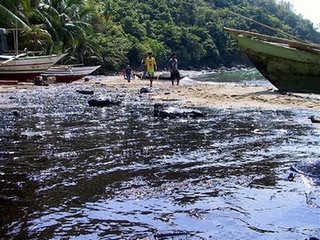Ticking Time Bomb
The recent Guimaras oil spill really saddens me, and perhaps every environment-loving person not only here in the Philippines, but anywhere in the world. The white beaches in the Visayas islands are known to be one of the best ones in Asia. And the same group of islands has been considered the center of the world's richest marine life.
However, because of the sinking of Solar 1 somewhere near Guimaras, a major environmental disaster is threatening the area. Solar 1 was carrying 2 million liters of bunker fuel. When it sank, it leaked around 200,000 liters, which had gradually spread towards the nearby islands of Panay and Negros. This means that there is about 1.8 million liters still trapped inside the tanker at the bottom of the sea, and is slowly continuing to leak. Hence, this is why some refer to this looming catastrophy as an ecological "ticking time bomb." Sooner or later, the entire amount of fuel will completely leak out of the vessel and harm the rich marine resources in the area. Unless we do something about it, potentially the biggest oil spill in our country's history (there was a 300,000 liter oil spill off Semirara island last year) may even possibly reach the nearby Boracay island, famous for its white beach.
sank, it leaked around 200,000 liters, which had gradually spread towards the nearby islands of Panay and Negros. This means that there is about 1.8 million liters still trapped inside the tanker at the bottom of the sea, and is slowly continuing to leak. Hence, this is why some refer to this looming catastrophy as an ecological "ticking time bomb." Sooner or later, the entire amount of fuel will completely leak out of the vessel and harm the rich marine resources in the area. Unless we do something about it, potentially the biggest oil spill in our country's history (there was a 300,000 liter oil spill off Semirara island last year) may even possibly reach the nearby Boracay island, famous for its white beach.
However, because of the sinking of Solar 1 somewhere near Guimaras, a major environmental disaster is threatening the area. Solar 1 was carrying 2 million liters of bunker fuel. When it
 sank, it leaked around 200,000 liters, which had gradually spread towards the nearby islands of Panay and Negros. This means that there is about 1.8 million liters still trapped inside the tanker at the bottom of the sea, and is slowly continuing to leak. Hence, this is why some refer to this looming catastrophy as an ecological "ticking time bomb." Sooner or later, the entire amount of fuel will completely leak out of the vessel and harm the rich marine resources in the area. Unless we do something about it, potentially the biggest oil spill in our country's history (there was a 300,000 liter oil spill off Semirara island last year) may even possibly reach the nearby Boracay island, famous for its white beach.
sank, it leaked around 200,000 liters, which had gradually spread towards the nearby islands of Panay and Negros. This means that there is about 1.8 million liters still trapped inside the tanker at the bottom of the sea, and is slowly continuing to leak. Hence, this is why some refer to this looming catastrophy as an ecological "ticking time bomb." Sooner or later, the entire amount of fuel will completely leak out of the vessel and harm the rich marine resources in the area. Unless we do something about it, potentially the biggest oil spill in our country's history (there was a 300,000 liter oil spill off Semirara island last year) may even possibly reach the nearby Boracay island, famous for its white beach.Greenpeace, an environmental organization, describes the area hit as a delicate ecosystem rich in marine life, mangroves and reefs. It is really too early to assess the damage caused by the oil spill. As of the past weekend, oil from the tanker has contaminated some 220 kilometers of coastline, destroyed 454 hectares of mangroves and 58 hectares of seaweed farms. The spill had also destroyed the livelihoods of thousands of people dependent on fishing for a living. It could also be disastrous to the tourism industry in the areas affected.
Just how could we prevent the oil spill from becoming worse? How can we stop the flow of oil leaking from the sunken vessel? The problem is we do not have the technology to "suck" all the oil from the tanker. We do not even know the exact location of the vessel. And if we do know where it really is, still our divers and marine equipment do not have the capabilities to go that deep underwater - about 3,000 feet.
The only thing we could do right now is to clean-up the seas in our own little ways. It is said that it would take years before we could totally clean the sea. The hundreds of villagers in the area are trying to mop up the slick with improvised tools such as bamboo poles, rice straw, dried grass, used sacks and even clothing. At sea and off beaches booms have been erected to contain the oil which is scooped out and taken away for disposal.
It's a good thing the government has already asked for foreign assistance. To me, that's the only chance we could still somehow contain the calamity. Let us remember that the environment is something we should all be responsible for because it doesn't only affect a country, but it affects the entire world as well. Hopefully, its not yet too late.
Labels: current events, environment


 design and layout by: radar web studios
design and layout by: radar web studios
<< Home